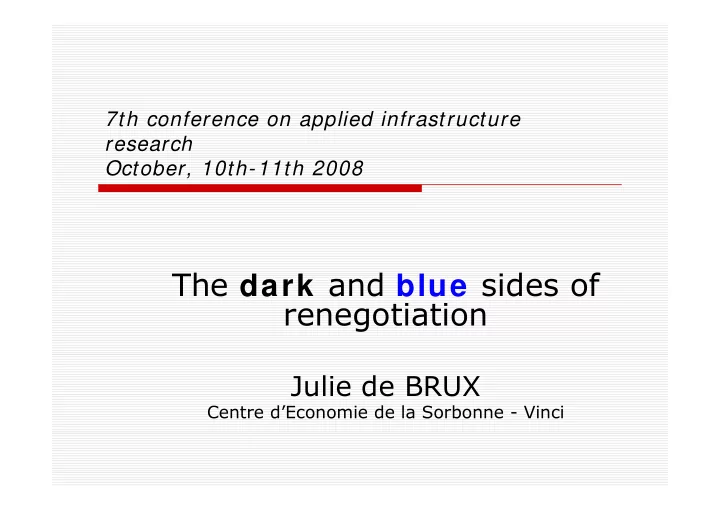

7th conference on applied infrastructure research October, 10th-11th 2008 The dark and blue sides of renegotiation Julie de BRUX Centre d’Economie de la Sorbonne - Vinci
Timing of the presentation � The dark side � what economics literature tells us about renegotiation � The blue side � case study of a triple-win renegotiation � Comments and perspectives
The dark side of renegotiation � Agency theory � Renegotiating enables to come over clauses that provided incentives � So the contract is not efficient anymore � λ (0;1) is the reneg coefficient affecting the global surplus of the contract � � Renegotiating = lack of credibility � Parties must avoid renegotiation
The dark side of renegotiation � Transaction costs theory � Parties renegotiate to share the cake differently… � To have a bigger portion!!! � But renegotiating is costly: sunk ink costs, financial expenses, etc. � So finally, because of all these transaction costs, the whole cake is smaller than initially �
The dark side of renegotiation � Reasons for renegotiation : � Opportunism of the private operator (Guasch, Laffont, Straub) � Opportunism from the public authority: elections, changing rules of the game, etc. (Engel-Fischer-Galetovic) � Third party opportunism = interest groups (Spiller) � Renegotiation = the roots of public discontent (Martimort-Straub)
From the dark side to the blue side � And what if: Public authority (B) cooperates Acts opportunis tically (1;1) (-3;2) Cooperates Private (2;-3) (-1;-1) Acts operator (A) opportunis tically � And what if renegotiation= cooperation and natural adaptation?
The blue side of renegotiation � Object of the study � PPP contracts � Applied to transport infrastructure � In a developing country � Methodology � A case study checking that the cooperative solution exists � Institutional context (1) � Content of the amendment (2) � Outcome of the renegotiation (3)
The blue side of renegotiation � (1) Institutional context � Political instability � Economically devastated country � No previous airport concession in the world � After 2 calls for tenders, a consortium of a French and a malaysian company won the bid for the airport contract in 1995, for 20 years � main feature of the context: uncertainty
The blue side of renegotiation � (2)Content of the amendment: � Until 1997, consolidation + building of infrastructure. � Traffic growth � Banks ready for the financial closing to build the new terminal
The blue side of renegotiation � (2) Content of the amendment (ctd): � In 1997: Asian economic crisis + military insurrection in Cambodia � Turnover from +4 million USD to -40 million USD in a few months � The banks cancelled their loans � The concession was bankrupting, since the traffic forecasts collapsed � Airport = battlefield
The blue side of renegotiation � (2) Content of the amendment (ctd) : � The concessionnaire could have used its COFACE and gone away from Cambodia � The Cambodian government agreed with this solution � But both parties finally decided to concentrate their efforts to find a solution that would be sustainable for all � The 1rst amendment was born (July 6th 1997)
The blue side of renegotiation � (2) Content of the amendment (ctd) : = compromise between a compensation for the � concessionaire’s losses and the willingness not to empoverish the Cambodian State = extension of the concession duration of 5 � years + creation of a compensation account, credited with the insurance compensation and a portion of the revenue sharing the Cambodian government was entitled to At the same time, the operator modified its financial model in order to fit with the adjusted traffic forecasts
The blue side of renegotiation � (3) Outcome of the renegotiation � 1. For the Cambodian government: - There is now a running airport, that generates cashflows (revenue sharing rapidly went back to normal, since the concession quickly went back on its feet) - This success may have helped for reelection
The blue side of renegotiation � (3) Outcome of the renegotiation � 2. For the private operator: - Positive profits - Important reputational gains, due to the success of the first worldwide airport concession, in spite of the technical and institutionnal challenges
The blue side of renegotiation � (3) Outcome of the renegotiation: � 3. For the Cambodian population: - Employment - Consumption - Development of tourism - Rise of the economic activity
The blue side of renegotiation � (3) Outcome of the renegotiation: � = triple-win game � Without renegotiation, the concession would have been interrupted. � The « Spirit » of the contract prevailed over the « letter » of the contract � Cooperation prevailed over opportunism to promote human and business development
A few comments and perspectives � Cooperative renegotiations exist, even in public-private partnerships (Katz,2008, shows it for private- private relationships) � Sometimes, renegotiation is not only advantageous, but even saving! � This paper challenges systematic analysis in terms of opportunism
A few comments and perspectives � Why not use relational contract theory to modelize future work on renegotiation? � We should also adress the question of the determinants of opportunism and cooperation (eg:new information, force majeure, innovation…)
Recommend
More recommend